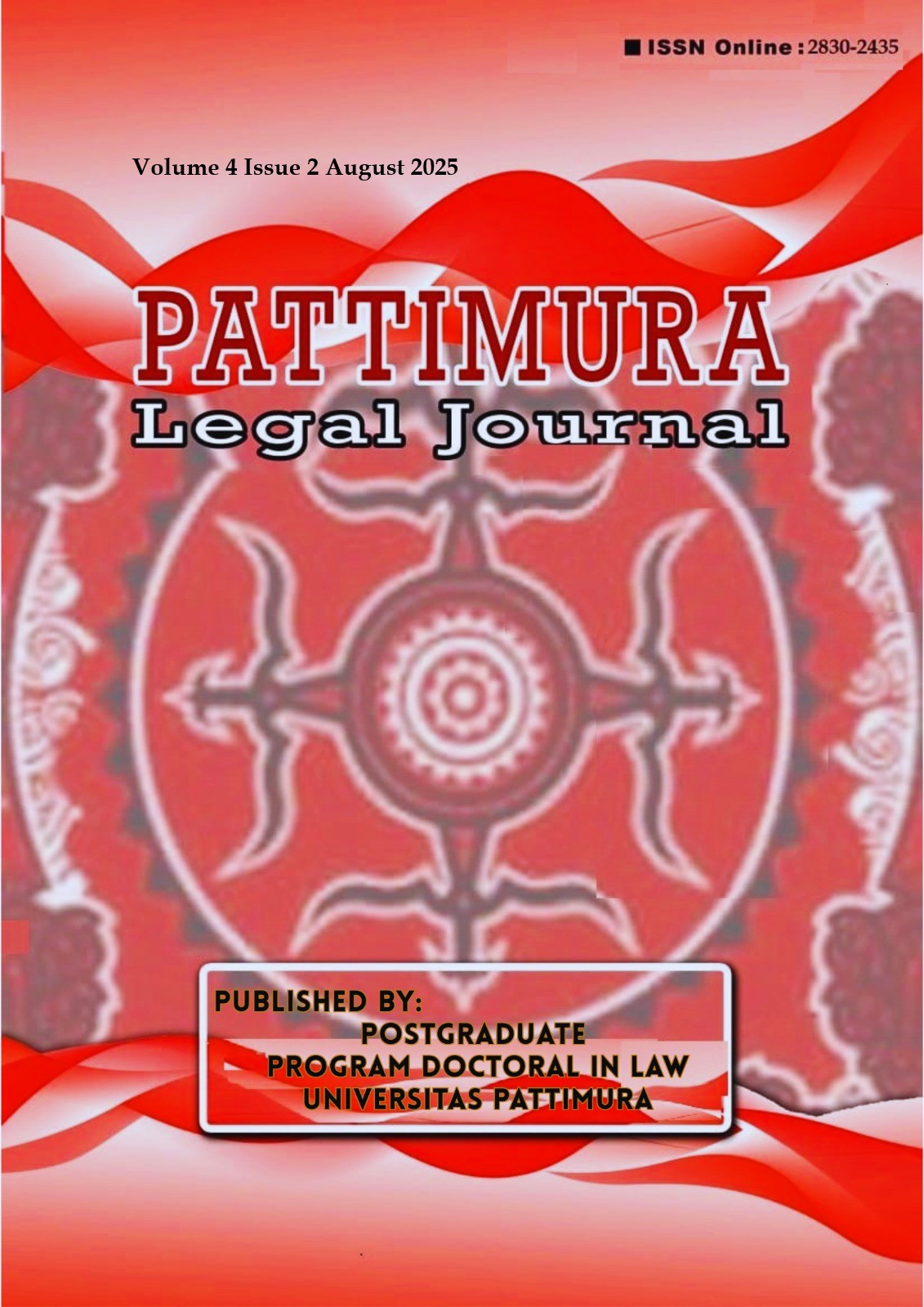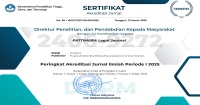The Government's Role in Legal Protection of Workers on Fixed-Time Employment Agreements in the Context of Boycotting Pro-Israel Products
Abstract
Introduction: Boycotts of products associated with support for Israel can have an impact on business and employment, especially for workers with Fixed-Time Employment Agreements.
Purposes of the Research: This study discusses the role of the government in providing legal protection for Fixed-Time Work Agreement workers in the midst of the boycott, with a case study on Starbucks Coffeeshop in Semarang City. The phenomenon of boycotts often affects the sustainability of the business and the stability of the workforce, especially Fixed-Time Employment Agreements workers who are more vulnerable to Termination of Employment.
Methods of the Research: This study uses an empirical juridical method with a qualitative approach, examining labor regulations and the implementation of legal protection policies for Fixed-Time Work Agreements workers in situations of business uncertainty due to boycott actions.
Results Main Findings of the Research: The results of the study show that labor regulations have regulated protections for Fixed-Time Work Agreement workers, including the right to compensation upon termination of employment. However, there is still room for improvement, especially in the aspect of supervision and law enforcement, so that every Fixed-Time Work Agreement worker can obtain his rights fairly and in accordance with applicable regulations. The government has a strategic role in ensuring that workers' rights remain protected, both through labor policies, industrial relations mediation, and the provision of legal aid for workers affected by Termination of Employment. The study recommends strengthening regulations and oversight to ensure more effective protections for Fixed-Time Employment Agreements workers amid the impact of boycotts on the employment sector.
Downloads
References
Alifya, Afifah Ilmi, Agna Khoerunnisa, Asri Mariam Syarah, Deden Zaenal Abidin, Ghaitsa Mutiara Putri, Iis Istiqomah, and Mia Lasmi Wardiyah. “Analisis Dampak Gerakan Boikot Produk Pro-Israel Terhadap Penjualan Starbucks Dan Kopi Lokal Di Indonesia.” Neraca: Jurnal Ekonomi, Manajemen Dan Akuntansi 2, no. 6 (2024): 633–642. https://jurnal.kolibi.org/index.php/neraca/article/view/1869.
ALSALC UGM. “Permasalahan Regulasi PKWT Dalam UU Cipta Kerja Yang Dapat Merugikan Tenaga Kerja.” alsalcugm.org, 2023. https://www.alsalcugm.org/single-post/permasalahan-regulasi-pkwt-dalam-uu-cipta-kerja-yang-dapat-merugikan-tenaga-kerja.
Anggraini, Oktavia Eko. “Analisis Yuridis Perjanjian Kerja Waktu Tertentu Menurut Hukum Ketenagakerjaan Indonesia.” Sanskara Hukum Dan HAM 1, no. 1 (2022): 11–23. https://sj.eastasouth-institute.com/index.php/shh/article/view/4.
Antoni, Herli, N Sebina, T Tatang, M Rakha, and N Ipanda. “Implikasi Hukum Dan Ekonomi Gerakan Boikot Produk Pro-Israel Terhadap Perindustrian Di Indonesia.” PALAR: Pakuan Law Review 10, no. 4 (2024): 1–15. https://journal.unpak.ac.id/index.php/palar/article/view/10850.
Asyhadie, Zaeni, Lalu Hadi Adha, and Rahmawati Kusuma. “Peranan San Tanggung Jawab Serikat Pekerja Dalam Menciptakan Hubungan Kerja Yang Harmonis.” Privat Law 1, no. 2 (2021): 320–38. https://doi.org/10.29303/prlw.v1i2.716.
Attallah, Oemar, Niken Rahmawati, Putri Damayanti, Anis Monica Sari, Nailatuz Zahro, Irza Annisa Zahra, Rizqa Ayu Ambarwati, Yulianis Satul Faidhah, and Novi Amalia Permatasari. “Optimalisasi Kebijakan Ketenagakerjaan Untuk Mengatasi Dampak PHK Massal Dan Meningkatkan Perlindungan Pekerja.” Media Hukum Indonesia (MHI) 2, no. 4 (2024): 643–54. https://ojs.daarulhuda.or.id/index.php/MHI/article/view/955.
Auli, Renata Christha. “Cara Hitung Pesangon Berdasarkan UU Cipta Kerja.” hukumonline.com, 2024. https://www.hukumonline.com/klinik/a/cara-hitung-pesangon-lt515b7ec90fe0c/.
BBC News Indonesia. “Ancaman PHK Di Indonesia Imbas Aksi Boikot Israel - 'Karyawan Kontrak Benar-Benar Kena Dampaknya’.” Bbc.com, 2023. https://www.bbc.com/indonesia/articles/cqep6rvnlgeo.
Fahrezi, Aldi, Feby Maharani, Nurul Ramadhan, and Daffarel Athallah. “Kontra Boikot Produk Starbuck: Menimbang Dampak Ekonomi Lokal Dan Solusi Berkelanjutan.” Suara USU, 2024. https://suarausu.or.id/kontra-boikot-produk-starbuck-menimbang-dampak-ekonomi-lokal-dan-solusi-berkelanjutan/.
Ilela, Yudith, Adonia Ivonne Laturette, and Sarah Selfina Kuahaty. “Penerapan Sistem Perjanjian Kerja Waktu Tertentu Dalam Perspektif Hukum Positif Indonesia.” PAMALI: Pattimura Magister Law Review 4, no. 2 (2024): 226–38. https://doi.org/10.47268/pamali.v4i2.2144.
J. Moleong, Lexy. Metodologi Penelitian Kualitatif. Bandung: PT Remaja Rosdakarya, 2017.
JDIH: Kementerian Ketenagakerjaan Republik Indonesia. “Apa Saja Kompensasi Yang Didapat Pekerja/Buruh Dengan Perjanjian Kerja Waktu Tertentu (PKWT)?” jdih.kemnaker.go.id, 2021. https://jdih.kemnaker.go.id/berita-apa-saja-kompensasi-yang-didapat-pekerjaburuh-dengan-perjanjian-kerja-waktu-tertentu-pkwt.html.
JDIH Kabupaten Sukoharjo. “Karyawan Kontrak Resign, Berhak Dapat Uang Kompensasi?” jdih.sukoharjokab.go.id, n.d. https://jdih.sukoharjokab.go.id/berita/detail/karyawan-kontrak-resign-berhak-dapat-uang-kompensasi.
Kusuma, Ahmad Jaya, Edith Ratna M.S, and Irawati. “Kedudukan Hukum Pekerja PKWT Yang Tidak Sesuai Dengan Ketentuan Undang-Undang Ketenagakerjaan.” Notarius 13, no. 1 (2020): 193–208. https://doi.org/10.14710/nts.v13i1.30324.
Latupono, Barzah. “Perlindungan Hukum Dan Hak Asasi Manusia Terhadap Pekerja Kontrak (Outsourcing) Di Kota Ambon.” SASI 17, no. 3 (2011): 59–69. https://doi.org/10.47268/sasi.v17i3.366.
Maharany, Chezia. “Perlindungan Hukum Terhadap Pekerja PKWT Atas Pemutusan Hubungan Kerja Sepihak Sebelum Masa Kontrak Berakhir.” Media Hukum Indonesia (MHI) 2, no. 3 (2024): 332–39. https://doi.org/10.5281/zenodo.12174047.
Makadolang, Equino Mikael, Ronny Adrie Maramis, and Lendy Siar. “Perlindungan Hukum Terhadap Pekerja Pada Perjanjian Kerja Waktu Tertentu (PKWT) Yang Di Berhentikan Sebelum Waktunya.” Lex Privatum 13, no. 3 (2024): 1–10. https://ejournal.unsrat.ac.id/index.php/lexprivatum/article/view/54841.
Marbun, Daniel Anugrah, Edo Immanuel Sinaga, Felix Raphael Sianturi, T. Faiz Mubarak Zulkarnain, Rizki Hazira, Nadia Sarita, and Nirwana Dewantari Yani Putri. “Pengaruh Boikot Besar-Besaran Produk Amerika Terhadap Peningkatan Jumlah Pengangguran Di Indonesia.” Polyscopia 1, no. 3 (2024): 127–30. https://doi.org/10.57251/polyscopia.v1i3.1346.
Permana, Erwin, Dhea Novtalia Wijaya, Lutfita Khoirunisa, and Samsyurizal. “Strategi Pemasaran Perusahaan Starbucks Terhadap Penurunan Saham Akibat Boikot Produk.” Jurnal Ekonomi, Akuntansi, Dan Perpajakan 1, no. 2 (2024): 208–223. https://doi.org/10.61132/jeap.v1i2.309.
Rafifah, Jihan, Riyanti Angelina, Enjum Jumhana, Nazwa Aura Fatima, and Wafiroh. “Implementasi Dan Tantangan Perlindungan Hukum Terhadap Hak-Hak Pekerja Dalam Hubungan Kerja Di Indonesia.” Konsensus: Jurnal Ilmu Pertahanan, Hukum Dan Ilmu Komunikasi 2, no. 1 (2025): 147–57. https://doi.org/10.62383/konsensus.v2i1.626.
Salsabilla, Rindi. “3 Fakta Gerakan Boikot Starbucks, Benarkah Sokong Israel?” cnbcindonesia.com, 2023. https://www.cnbcindonesia.com/lifestyle/20231102110948-33-485757/3-fakta-gerakan-boikot-starbucks-benarkah-sokong-israel.
Sinaga, Niru Anita, and Tiberius Zaluchu. “Perlindungan Hukum Hak-Hak Pekerja Dalam Hubungan Ketenagakerjaan Di Indonesia.” Jurnal Teknologi Industri 6 (2017): 56–70. https://journal.universitassuryadarma.ac.id/index.php/jti/article/view/754.
Soemitro, Ronny Hanitijo. Metodologi Penelitian Hukum Dan Jurimetri. Jakarta: Ghalia Indonesia, 1990.
Starbucks Corporation. “Our Position on the Middle East False Rumors.” Starbucks Stories & News, 2024. https://stories.starbucks.com.
Sumarna, Dadang, and Ayyub Kadriah. “Penelitian Kualitatif Terhadap Hukum Empiris.” Jurnal Penelitian Serambi Hukum 16, no. 2 (2023): 101–113. https://doi.org/10.59582/sh.v16i02.730.
Surya, I Kadek Adi, I Dewa Nyoman Gde Nurcana, and I Wayan Antara. “Kajian Yuridis Perlindungan Hukum Bagi Tenaga Kerja Dalam Perjanjian Kerja Waktu Tertentu (PKWT) Berdasarkan Undang Undang No 13 Tahun 2003 Tentang Ketenagakerjaan.” Majalah Ilmiah Universitas Tabanan 17, no. 2 (2020): 130–36. https://ejournal.universitastabanan.ac.id/index.php/majalah-ilmiah-untab/article/view/90.
Thooriq, Faridha Ath. “Perlindungan Hukum Dan Hak Asasi Manusia Terhadap Pekerja Kontrak Di Indonesia (Implementasi Berdasarkan Undang-Undang Ketenagakerjaan).” Gema Keadilan 10, no. 3 (2023): 153–69. https://doi.org/10.14710/gk.2023.20428.
Tirto Creative Lab. “Dampak Boikot Tidak Terarah Bagi Perekonomian Indonesia.” tirto.id, 2024. https://tirto.id/dampak-boikot-tidak-terarah-bagi-perekonomian-indonesia-g6tp.
Wijayanti, Asri. Hukum Ketenagakerjaan Pasca Reformasi. Jakarta: Sinar Grafika, 2009.
Copyright (c) 2025 Yasmine Putri Andrian, Tri Sulistiyono, Shinta Widi Deswinta (Author)

This work is licensed under a Creative Commons Attribution-NonCommercial 4.0 International License.
Authors who publish their manuscripts in this Journal agree to the following conditions:
- The copyright in each article belongs to the author, as well as the right to patent.
- Authors are able to enter into separate, additional contractual arrangements for the non-exclusive distribution of the journal's published version of the work (e.g., post it to an institutional repository or publish it in a book), with an acknowledgment of its initial publication in this journal.
- Authors are permitted and encouraged to post their work online (e.g., in institutional repositories or on their website) prior to and during the submission process, as it can lead to productive exchanges, as well as earlier and greater citation of published work.
- Authors have the right to self-archiving of the article (Author Self-Archiving Policy)






















